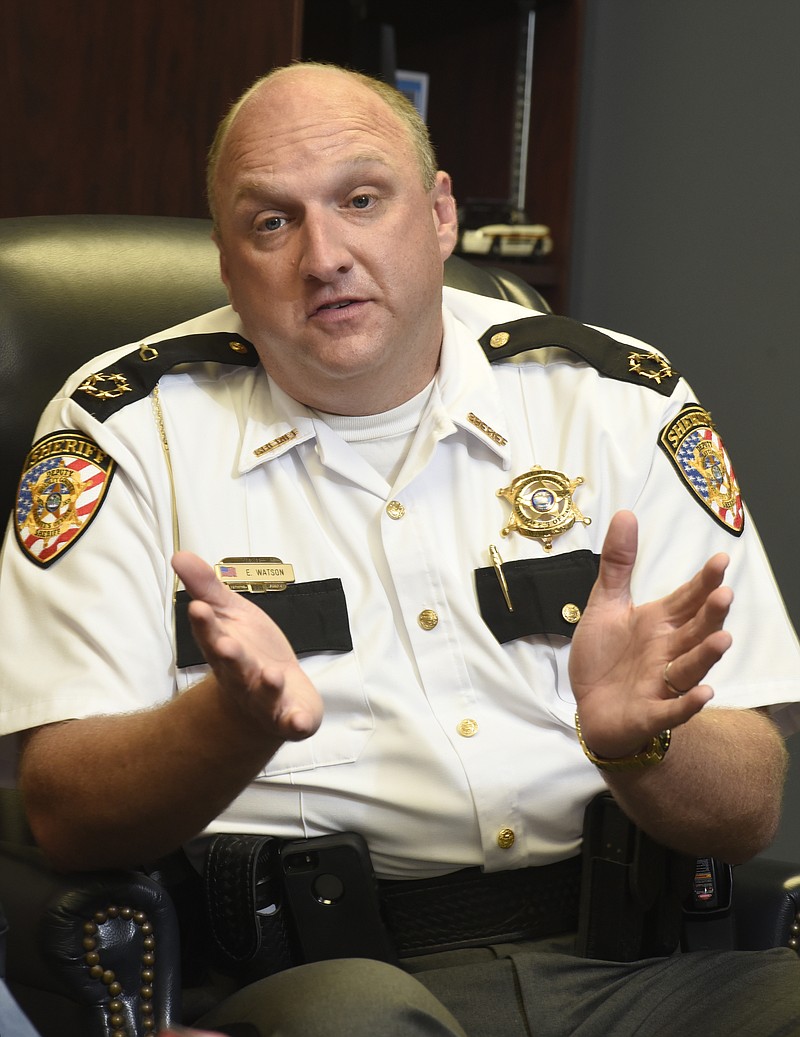When questions arose last month regarding Bradley County Sheriff Eric Watson's wife - a bail bonding agent - being on the scene of a DUI checkpoint, he had a simple explanation: They were out to dinner when he heard on the radio about 7:45 p.m. that his men were chasing someone who tried to evade the checkpoint.
He had to go, he said, and he couldn't leave his wife by herself, so he took her along.
But a Bradley County deputy's affidavit and radio logs show that's not the way events unfolded.
The computer dispatch report from the Cleveland Bradley Communications Center shows Watson arrived at the March 5 checkpoint site on Lower River Road in Charleston, Tenn., at the same time as eight other deputies - 6:39 p.m.
The dispatch report shows Watson made the first radio call - "BR1 attempting to catch up to [vehicle on] Lower River towards Meigs County" - at 7:44 p.m. when a driver tried to turn around and avoid the assemblage of law officers.
And Deputy Daniel Marlow's arrest affidavit said Watson and Sgt. Mario Santos were the first two vehicles to pursue the fleeing driver, who escaped but turned himself in later.
Meanwhile, Watson's wife, Tenille, not only rode to the checkpoint site in her husband's county vehicle, she was in the roll call assembly that gathered before the deputies drove out to the checkpoint site, multiple sources told the Times Free Press.
That contradicts Watson's statement in a March 20 Times Free Press story on whether it is a conflict of interest for the sheriff's wife to write bonds for the same people her husband's employees place under arrest.
Watson did not return phone, text or email messages seeking comment Friday afternoon.
Multiple sources in the March 20 story said Watson had driven his wife to the jail at least twice to write bonds for people. In response, he said, "I don't transport her around when she makes bonds."
On the Monday after that Saturday checkpoint, Tenille Watson, who works for Cumberland Bail Bonds, wrote the single largest number of bonds from that weekend's arrests among nine bonding companies, General Sessions Court records show.
When Tenille Watson got her bail bonding license in February, some local bondsmen called it a conflict of interest and feared she would get preferential treatment. All spoke anonymously for fear of retaliation.
"We're all unhappy," said one. "If she can do that, why can't we ride with police officers?"
Tennessee law says certain people, including most law enforcement officers, can't be bail bondsmen. A 2014 Tennessee Attorney General's opinion also says those people's husbands or wives also should not write bonds because the income from their jobs would indirectly benefit their publicly employed spouses.
The only way around it, the attorney general's opinion said, would be for the couple to completely separate their finances. They couldn't own homes or cars together or share a bank account. The bondsman couldn't so much as pay household bills or buy groceries that a spouse would consume.
Watson said in the March 20 story that's what he and his wife did, as soon as she became a bondsman.
"It doesn't touch me," he said.
However, Joel H. Moseley Jr., general counsel for the Tennessee Association of Professional Bail Agents, said in that March story that maintaining completely separate finances would be a challenge.
"It's possible in this day and age that two people can love each other, be husband and wife, and not commingle funds. It would be very difficult, but it could happen," Moseley said.
